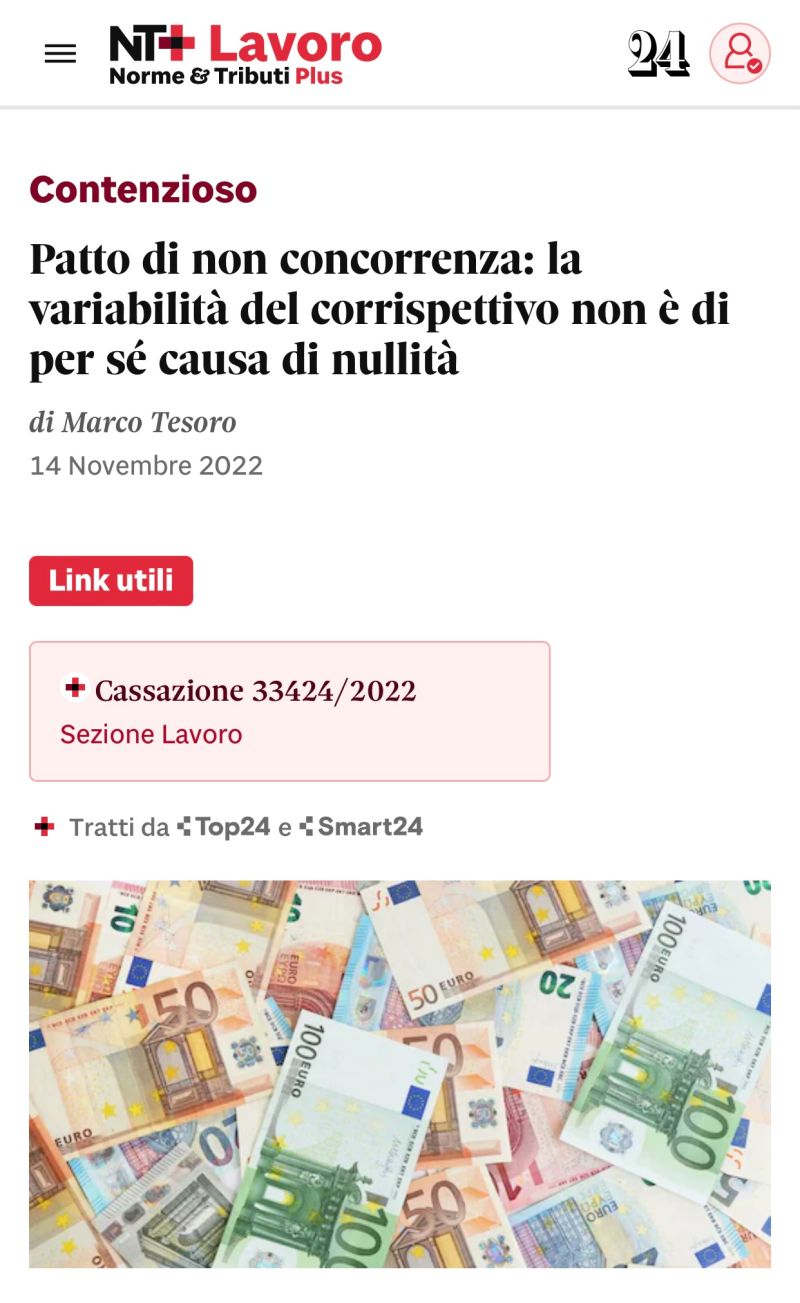
Published on Sole24Ore – NT Lavoro – 15/11/2022
The variability of the payment of the non- compete covenant with respect to the duration of the employment does not mean that it is not determinable on the basis of objective parameters, whereas the question of nullity on the grounds of the indefiniteness or indeterminability of the payment (Article 1346 of the Civil Code) and nullity on the grounds of its non-existence (Article 2125 of the Civil Code) or on the grounds of symbolic or manifestly unfair or disproportionate consideration must be assessed separately.
Thus, the Court of Cassation with its judgment no. 3424/2022
In the specific case, the Court of Milan had declared the non-compete covenant entered into by the parties was null and void by virtue of the indefiniteness and indeterminability of the payment, as it was related to the duration of the employment and without any guaranteed minimum amount. In particular, against a non-compete covenant valid for twenty months from the termination of the employment relationship, the parties had agreed on an annual fee of €.10.000 for three years, to be paid in two six-monthly tranches.
According to the interpretation of the Milan Court, which was confirmed by the Appeal Court, the nullity arose from the fact that, in the event of termination of the employment before the expiry of the three-year period, as occurred, the employee would not have been due the full payment of €. 30.000, but rather an amount linked to the duration of the employment, therefore not determined or determinable.
The Court of Cassation, hearing the issue, upheld the company’s appeal on the ground that it was not clear what logical-motivational procedure had been followed by the trial court. With reference to the determinability of the payment of the non-compete covenant, the Court recalls that this amount is different and distinct from the remuneration, so it must only possess the requirements provided for in general for the object of the performance by Article 1346 of the Civil Code. In a different respect, the Court recalls that nullity under Article 2125 of the Civil Code only occurs following a strict assessment as to the existence of a payment in favour of the employee that is manifestly unfair or disproportionate in relation to the sacrifice required and to all the circumstances of the case.
For the Supreme Court, therefore, the nullity of the non-compete covenant for indefiniteness or indeterminability of the payment and the nullity of the covenant for lack of payment or, in the case of manifestly unfair or disproportionate payment (a hypothesis equated by the jurisprudence of legitimacy) operate on two distinct levels. With respect to these premises, the judges note a motivational anomaly in the judgment appealed, in that it came to affirm the nullity of the covenant in an improper manner, without ascertaining whether the agreed consideration was to be considered symbolic or manifestly inequitable or disproportionate and by overlapping the question of the determinability of the payment, which is different from the question of its appropriateness.
In fact, according to the Court of Cassation, “the variability of the payment with respect to the duration of the employment does not mean that it is not determinable on the basis of objective parameters (also taking into account that, upstream, it was also disputed that the termination of the employment actually had an influence on the amount of the non-compete covenant due)”. The judgment under appeal does not adequately distinguish causes of nullity of the non-compete covenant that legally operate on different levels – one defect under the aspect of the determinateness or determinability of the objection and the other under the profile of the amount of the payment – and this overlap generates uncertainty on the logic-iter followed by the judge, which precludes an effective check on the accuracy and logicality of his reasoning.

